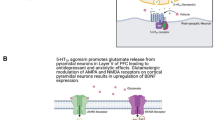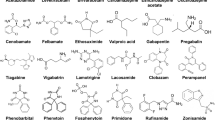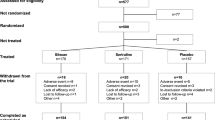Summary
Most major affective disorders are, from a longitudinal perspective, recurrent conditions. This article reviews the rationale for longer term models of antidepressant treatment, including strategies for the prevention of relapse (defined as an increase of symptoms back to a syndromallevel after an initial treatment response) and recurrence (defined as the onset of a distinctly new episode of affective illness).
To prevent relapse, it is recommended that all patients whose symptoms remit during pharmacotherapy receive 4 to 6 months of continuation therapy. Those patients at increased risk for subsequent recurrent depressive episodes should be considered for an extended course of maintenance pharmacotherapy. The efficacy of tricyclic antidepressants, lithium and the selective serotonin (5-hydroxytryptamine; 5-HT) reuptake inhibitors for the prevention of recurrent depression has been established, with the latter class having a clinical advantage in terms of common adverse effects and safety in overdose.
With each new episode of depressive illness, the risk of illness becoming more autonomous, severe and potentially refractory may increase. Thus, prophylactic treatment of patients at risk of recurrent depression remains the best way to optimise their long term outcome.
Similar content being viewed by others
References
Klerman GL. The current age of youthful melancholia: evidence for increase in depression among adolescents and young adults. Br J Psychiatry 1988; 152: 4–14
Klerman GL, Weissman MM. Increasing rates of depression. JAMA 1989; 261: 2229–35
Weissman MM, Leaf PJ, Tischler GL, et al. Affective disorders in five United States communities. Psychol Med 1983; 18: 141–53
Weissman MM, Leaf PJ, Bruce ML, et al. The epidemiology of dysthymia in five communities: rates, risks, comorbidity, and treatment. Am J Psychiatry 1988; 145: 815–9
Angst J, Baastrup P, Grof P, et al. The course of monopolar depression and bipolar psychoses. Psychiatr Neurol Neurochir 1973; 76: 489–500
Zis AP, Goodwin FK. Major affective disorder as a recurrent illness: a critical review. Arch Gen Psychiatry 1979; 36: 835–9
Keller MB, Hanks DL. The natural history and heterogeneity of depressive disorders: implications for rational antidepressant therapy. J Clin Psychiatry 1994; 55 (9 Suppl.): 25–31
Robins LN, Helzer JE, Weissman MM, et al. Lifetime prevalence of specific psychiatric disorders in 3 sites. Arch Gen Psychiatry 1984; 41: 949–58
Consensus Development Panel. Mood disorders: pharmacologic prevention of recurrences [NIMHINIH Consensus Development Conference Statement). Am J Psychiatry 1985; 142: 469–76
Consensus statement: WHO mental health collaborating centers. J Affect Disord 1989; 17: 197–8
Goodwin FK, Jamison KR. Manic-depressive illness. New York: Oxford University Press, 1990
Keller MB, Klerman GL, Lavori PW, et al. Treatment received by depressed patients. JAMA 1982; 248: 1848–55
Keller MB, Lavori PW, Klerman GL, et al. Low levels and lack of predictors of somatotherapy and psychotherapy received by depressed patients. Arch Gen Psychiatry 1986; 43: 458–66
Thase ME. Relapse and recurrence in unipolar major depression: short-term and long-term approaches. J Clin Psychiatry 1990; 51 (6 Suppl.): 51–7
Sargeant JK, Bruce ML, Florio LP, et al. Factors associated with I-year outcome of major depression in the community. Arch Gen Psychiatry 1990; 47: 519–26
Barnett PA, Gotlib IA. Psychosocial functioning and depression: distinguishing among antecedents, concomitants, and consequences. Psychol Bull 1988; 104: 97–126
Keitner GI, Miller IW. Family functioning and major depression: an overview. Am J Psychiatry 1990; 147: 1128–37
Bauwens F, Tracy A, Pardoen D, et al. Social adjustment of remitted bipolar and unipolar outpatients: a comparison with age- and sex-matched controls. Br J Psychiatry 1991; 159: 239–44
Perugi G, Maremmani I, McNair D, et al. Differential changes in areas of social adjustment from depressive episodes through recovery. J Affect Disord 1988; 15: 39–43
Buydens-Branchey L, Branchey MG, Noumair D. Age of alcoholism onset. I: Relationship to psychopathology. Arch Gen Psychiatry 1989; 46: 225–30
Akiskal HS. Factors associated with incomplete recovery in primary depressive illness. J Clin Psychiatry 1982; 43: 266–71
Bresalau N, Kilbey MM, Andreski P. Nicotine dependence, major depression, and anxiety in young adults. Arch Gen Psychiatry 1991; 48: 1069–74
Belsher G, Costello CG. Relapse after recovery from unipolar depression: a critical review. Psychol Bull 1988; 104: 84–96
Fava GA, Kellner R. Prodromal symptoms in affective disorders. Am J Psychiatry 1991; 148: 823–30
Frank E, Prien RF, Jarrett RB, et al. Conceptualization and rationale for consensus definitions of terms in major depressive disorder: remission, recovery, relapse, and recurrence. Arch Gen Psychiatry 1991; 48: 851–5
Orleans CT, George LK, Houpt J, et al. How primary care physicians treat psychiatric disorders: a national survey of family practitioners. Am J Psychiatry 1985; 142: 52–7
Karasu TB. Psychotherapy and pharmacotherapy: toward an integrative model. Am J Psychiatry 1982; 139: 1102–13
Prien RF, Carpenter LL, Kupfer OJ. The definition and operational criteria for treatment outcome of major depressive disorder: a review of the current research literature. Arch Gen Psychiatry 1991; 48: 796–800
Beck AT, Rush AJ, Shaw BG, et al. Cognitive therapy of depression. New York: Guilford Press, 1979
Klerman GL, Weissman MM, Rounsaville BJ, et al., editors. Interpersonal psychotherapy of depression. New York: Basic Books, 1984
Dobson KS. A meta-analysis of the efficacy of cognitive therapy for depression. J Consult Clin Psychol 1989; 57: 414–9
Robinson LA, Berman JS, Neimer RA. Psychotherapy for treatment of depression: a review of the controlled outcome research. Psycho I Bull 1990; 108: 30–49
Simons AD, Thase ME. Mood disorders. In: Thase ME, Hersen M, Edelstein BA, editors. Handbook of outpatient treatment in adults. New York: Plenum Press, 1990: 91–138
Prien RF, Kupfer OJ. Continuation drug therapy for major depressive episodes: how long should it be maintained? Am J Psychiatry 1986; 143: 18–23
Montgomery SA, Doogan DP, Burnside R. The influence of different relapse criteria on the assessment of long-term efficacy of sertraline. Int Clin Psychopharmacol 1991 Dec 6; Suppl.2: 37–46
Doogan DP, Caillard V. Sertraline in the prevention of depression. Br J Psychiatry 1992; 160: 217–22
Montgomery SA, Dufour H, Brion S, et al. The prophylactic efficacy of fluoxetine in unipolar depression. Br J Psychiatry 1988; 153 Suppl.: 69–76
Montgomery SA, Rasmussen JGC, Tanghoj P. A 24-week study of 20 mg citalopram, 40 mg citalopram, and placebo in the prevention of relapse of major depression. Int Clin Psychopharmacol 1993; 8: 181–8
Montgomery SA, Dunbar G. Paroxetine is better than placebo in relapse prevention and the prophylaxis of recurrent depression. Int Clin Psychopharmacol 1993; 8: 189–95
Kocsis JH, Sutton BM, Sutton BM. Long-term follow-up of chronic depression treated with imipramine. J Clin Psychiatry 1991; 52: 56–9
Harrison W, Rabkin J, Stewart JW, et al. Phenelzine for chronic depression: a study of continuation treatment. J Clin Psychiatry 1986; 47: 346–9
Thase ME, Trivedi MH, Rush AJ. MAOI’s in the contemporary treatment of depression. Neuropsychopharmacology 1995; 12: 185–219
Billings AG, Moos RH. Life stressors and social resources affect post-treatment outcomes among depressed patients. J Abnorm Psychol 1985; 94: 140–53
Faravelli C, Ambonetti A, Pallanti S, et al. Depressive relapses and incomplete recovery from index episode. Am J Psychiatry 1986; 143: 888–91
Hammen C, Ellicott A, Gitlin M, et al. Sociotropy-autonomy and vulnerability to specific life events in patients with unipolar depression and bipolar disorders. J Abnorm Psychol 1989; 98: 154–60
Hooley JM, Teasdale JD. Predictors of relapse in unipolar depressives: expressed emotion, marital distress, and perceived criticism. J Abnorm Psychol 1989; 98: 229–35
Montgomery SA, Roberts A, Patel AG. Placebo-controlled efficacy of antidepressants in continuation treatment. Int Clin Psychopharmacol 1994; 9 Suppl.1: 49–53
Weissman MM, Klerman GL, Prusoff BA, et al. Depressed outpatients: one year after treatment with drugs and/or interpersonal psychotherapy. Arch Gen Psychiatry 1981; 38: 51–5
Thase ME, Simons AD, McGeary J, et al. Relapse following cognitive behavior therapy of depression: potential implications for longer-term forms of treatment? Am J Psychiatry 1992; 149: 1046–52
Evans MD, Hollon SO, DeRubeis RJ, et al. Differential relapse following cognitive therapy and pharmacotherapy for depression. Arch Gen Psychiatry 1992; 49: 802–8
Shea MT, Elkin I, Imber SO, et al. Course of depressive symptoms over follow-up: findings from The National Institute of Mental Health Treatment of Depression Collaborative Research Program. Arch Gen Psychiatry 1992; 49: 782–7
Thase ME, Simons AD. Cognitive behaviortherapy and relapse of nonbipolar depression: parallels with pharmacotherapy. Psychopharmacol Bull 1992; 28: 117–22
Frank E, Kupfer OJ, Perel JM. Early recurrence in unipolar depression. Arch Gen Psychiatry 1989; 46: 397–400
Dilsaver SC, Greden JF. Antidepressant withdrawal phenomena. Biol Psychiatry 1984; 19: 237–56
Montgomery SA. The efficacy of fluoxetine as an antidepressant in the short and long term. Int Clin Psychopharmacol 1989; 4: 113–9
Thase ME. Long-term treatments of recurrent depressive disorders. J Clin Psychiatry 1992; 53 Suppl.: 33–44
Prien RF. Long-term treatment of affective disorders. In: Meltzer HY, editor. Psychopharmacology: the third generation of progress. New York: Raven Press, 1987: 1051–8
Frank E, Kupfer OJ, Perel JM, et al. Three-year outcomes for maintenance therapies in recurrent depression. Arch Gen Psychiatry 1990; 47: 1093–9
Wright JH, Thase ME. Cognitive and biological therapies: a synthesis. Psychiatric Ann 1992; 22: 451–8
Jacob M, Frank E, Frank E, Frank E, et al. A psychoeducational workshop for depressed patients, families, and friends: description and evaluation. Hosp Community Psychiatry 1987; 38: 968–72
Prien RF, Kocsis JH. Long-term treatment of mood disorders. In: Bloom FE, Kupfer OJ, editors. Psychopharmacology: the fourth generation of progress. New York: Raven Press, 1995: 1067–79
Bjork K. The efficacy of zimelidine in preventing depressive episodes in recurrent major depressive disorders — a doubleblind placebo-controlled study. Acta Psychiatr Scand 1983; 308: 182–9
Davis JM. Overview: maintenance therapy in psychiatry. II: Affective disorders. Am J Psychiatry 1976; 133: 1–3
Schou M. Lithium as a prophylactic agent in unipolar affective illness. Arch Gen Psychiatry 1979; 36: 849–51
Coppen A, Ghose K, Rao R, et al. Mianserin and lithium in the prophylaxis of depression. Br J Psychiatry 1978; 133: 206–10
Glen AIM, Johnson AL, Shepherd M. Continuation therapy with lithium and amitriptyline in unipolar depressive illness: a randomized double-blind. Controlled trial. Psychol Med 1984; 14: 37–50
Prien RF, Kupfer DJ, Manskey PA, et al. Drug therapy in the prevention of recurrences in unipolar and bipolar affective disorders. Arch Gen Psychiatry 1984; 41: 1096–104
Johnstone WC, Owens DGC, Lambert MT, et al. Combination tricyclic antidepressant and lithium maintenance medication in unipolar and bipolar depressed patients. J Affect Disord 1990; 20: 225–33
Thase ME, Kupfer DJ, Frank E, et al. Treatment of imipramineresistant recurrent depression: II. An open clinical trial oflithium augmentation. J Clin Psychiatry 1989; 50: 413–7
Montgomery SA. Long-term treatment of depression. Br J Psychiatry 1994; 165 Suppl.26: 31–6
Georgotas A, McCue RE, Cooper TB. A placebo-controlled comparison of nortriptyline and phenelzine in maintenance therapy of elderly depressed patients. Arch Gen Psychiatry 1989; 46: 783–6
Robinson DS, Lerfald SC, Bennett B, et al. Continuation and maintenance treatment of major depression with the monoamine oxidase inhibitor phenelzine: a double-blind placebocontrolled discontinuation study. Psychopharmacol Bull 1991; 27: 31–9
Quitkin FM, Harrison W, Stewart JM, et al. Response to phenelzine and imipramine in placebo non-responders with atypical depression. Arch Gen Psychiatry 1991; 48: 319–23
Himmelhoch JM, Thase ME, Mallinger AG, et al. Tranylcypromine versus imipramine in anergic bipolar depression. Am J Psychiatry 1991; 148: 910–6
Thase ME, Frank E, Mallinger A, et al. Treatment of imipramine-resistant recurrent depression: III. Efficacy of monoamine oxidase inhibitors. J Clin Psychiatry 1992; 53: 5–11
Thase ME, Mallinger AG, McKnight D, et al. Treatment of imipramine resistant recurrent depression: IV. A double-blind. Crossover study of tranylcypromine in anergic bipolar depression. Am J Psychiatry 1992; 149: 195–8
Lonnqvist J, Sihvo S, Syvalahti E, et al. Moclobemide and fluoxetine in the prevention of relapses following acute treatment of depression. Acta Psychiatr Scand 1995; 91: 189–94
Moll E, Stabl M, Wegscheider R, et al. Long-term treatment with moclobemide. An open-label, non-comparative, multiple-distributed study in patients with a major depressive episode as defined by DSM-III. Psychopharmacology (Berl) 1992; 106 Suppl.: 120–2
Peselow ED, Difiglia C, Fieve RR. Relationship of dose to antidepressant prophylactic efficacy. Acta Psychiatr Scand 1991; 84: 571–4
Rouillon F, Serrurier D, Miller HD, et al. Prophylactic efficacy of maprotiline on unipolar depression relapse. J Clin Psychiatry 1991; 52: 423–31
Frank E, Kupfer DJ, Perel JM, et al. Comparison of full dose versus half dose pharmacotherapy in the maintenance treatment of recurrent depression. J Affect Disord 1993; 27: 139–45
Agosti V, Stewart JW, Quitkin FM, et al. Factors associated with premature medication discontinuation among responders to an MAOI or a tricyclic antidepressant. J Clin Psychiatry 1988; 49: 196–8
Schou M. Effects of long-term lithium treatment on kidney function: an overview. J Psychiatr Res 1988; 22: 287–96
Coppen A, Montgomery SA, Gupta RK, et al. A double-blind comparison of lithium carbonate and maprotiline in the prophylaxis of the affective disorders. Br J Psychiatry 1976; 128: 479–85
Mason BJ, Kocsis JH, Frances AJ, et al. Amoxapine versus amitriptyline for continuation therapy of depression. J Clin Psychopharmacol 1990; 10: 338–43
Fabre Jr LF, Feighner JP. Long-term therapy for depression with trazodone. J Clin Psychiatry 1983; 44: 17–21
Gardner EA. Long-term preventative care in depression: the use of bupropion in patient intolerant of other antidepressants. J Clin Psychiatry 1983; 44 (5. Sec 2): 157–62
Kupfer DJ, Frank E, Perel JM, et al. Five-year outcome for maintenance therapies in recurrent depression. Arch Gen Psychiatry 1993; 50: 24–30
Fava GA. Do antidepressant and antianxiety drugs increase chronicity in affective disorders? Psychother Psychosom 1994; 61: 125–31
Conte HR, Plutchik R, Wild KV, et al. Combined psychotherapy and pharmacotherapy for depression. Arch Gen Psychiatry 1986; 43: 471–9
Klerman GL, DiMascio A, Weissman M, et al. Treatment of depression by drugs and psychotherapy. Am J Psychiatry 1974; 131: 186–91
Weissman MM, Klerman GL, Paykel ES, et al. Treatment effects on the social adjustment of depressed patients. Arch Gen Psychiatry 1974; 30: 771–8
Frank E, Kupfer DJ, Wagner EF, et al. Efficacy of interpersonal psychotherapy as a maintenance treatment of recurrent depression: contributing factors. Arch Gen Psychiatry 1991; 48: 1053–9
Blackburn JM, Eunson KM, Bishop S. A two-year naturalistic follow-up of depressed patients treated with cognitive therapy, pharmacotherapy and a combination of both. J Affect Disord 1986; 10: 67–75
Kovacs M, Rush AJ, Beck AT, et al. Depressed outpatients treated with cognitive therapy of pharmacotherapy: a oneyear follow-up. Arch Gen Psychiatry 1981; 39: 33–9
Simons AD, Murphy GE, Levine JL, et al. Cognitive therapy and pharmacotherapy for depression: sustained improvement over one year. Arch Gen Psychiatry 1986; 43: 43–8
Fava GA, Grandi S, Zielezny M, et al. Cognitive behavioral treatment of residual symptoms in primary major depressive disorder. Am J Psychiatry 1994; 151: 1295–9
Thase ME. Maintenance treatments of recurrent affecti ve disorders. Curr Opin Psychiatry 1993; 6: 16–21
Kupfer DJ, Perel JM, Frank E. Adequate treatment with imipramine in continuation treatment. J Clin Psychiatry 1989; 50: 250–5
Fava M, Rappe SM, Pava J, et al. Relapse in patients on longterm fluoxetine treatment: response to increased fluoxetine dose. J Clin Psychiatry. In press
Vaughn CE, Leff JP. The influence of family and social factors on the course of psychiatric illness: a comparison of schizophrenic and depressed neurotic patients. Br J Psychiatry 1976; 129: 125–37
Hooley JM, Orley J, Teasdale JD. Levels of expressed emotion and relapse in depressed patients. Br J Psychiatry 1986; 148: 642–7
Frank E. Interpersonal psychotherapy as a maintenance treatment for recurrent depression. Psychotherapy 1991; 28: 259–66
Post RM, Weiss SB. Sensitization, kindling, and carbamazepine: an update on their implications for the course of affective illness. Pharmacopsychiatry 1992; 25: 41–3
Depression Guideline Panel. Depression in primary care: Vol. 12. Treatment of major depression, clinical practice guideline number 5. Rockville: Agency for Health Care Policy & Research; 1993: Publication no. 93-0551
Schatzberg AF, Rothchild AJ. Psychotic (delusional) major depression: should it be included as a distinct syndrome in DSMIV? Am J Psychiatry 1992; 25: 41–3
Spiker DG, Weiss JC, Dealy RS, et al. The pharmacological treatment of delusional depression. Am J Psychiatry 1985; 142: 430–6
Robinson DG, Spiker DG. Delusional depression: a one-year follow-up. J Affect Disord 1985; 9: 79–83
McElroy SL, Dessain EC, Pope Jr HG, et al. Clozapine in the treatment of psychotic mood disorders, schizoaffective disorder, and schizophrenia. J C1in Psychiatry 1991; 52: 411–4
Marder SR, Meibach RC. Risperidone in the treatment of schizophrenia. Am J Psychiatry 1994; 151: 825–35
Kay DWK, Fahy T, Garside RF. A seven-month double-blind trial of amitriptyline and diazepam in ECT-treated depressed patients. Br J Psychiatry 1970; 117: 556–71
Seager CP, Bird RL. Imipramine with electrical treatment in depression: a controlled trial. J Ment Sci 1962; 108: 704–7
Prudic J, Sackeim HA, Devanand DP. Medication resistance and clinical response to electroconvulsive therapy. Psychiatry Res 1989; 31: 287–96
Sackheim HA, Prudic J, Devanand DP, et al. The impact of medication resistance and continuation pharmacotherapy on relapse following response to electroconvulsive therapy in major depression. J Clin Psychopharmacol 1990; 10: 96–104
Thase ME, Ruch AI. Treatment resistant depression. In: Bloom FE, Kupfer DJ, editors. Psychopharmacology: a fourth generation of progress. New York: Raven Press, 1995: 1081–97
Kramer BA. Maintenance ECT: a survey of practice. Convulsive Ther 1987; 3: 260–8
Meader-Woodruff JH, Gurguis G, Grunhaus L, et al. Multiple depressive episodes and plasma postdexamethasone cortisol levels. Biol Psychiatry 1987; 22: 583–92
Thase ME, Kupfer DJ, Frank E, et al. Electroencephalographic sleep profiles in single and multiple episode forms of major depression: I. Comparison during acute depressive states. Bioi Psychiatry. In press
Thase ME, Howland R. Biological processes in depression: updated review and integration. In: Beckham E, editor. Handbook of depression. New York: Guilford Publications. In press
Author information
Authors and Affiliations
Rights and permissions
About this article
Cite this article
Thase, M.E., Sullivan, L.R. Relapse and Recurrence of Depression. CNS Drugs 4, 261–277 (1995). https://doi.org/10.2165/00023210-199504040-00004
Published:
Issue Date:
DOI: https://doi.org/10.2165/00023210-199504040-00004




